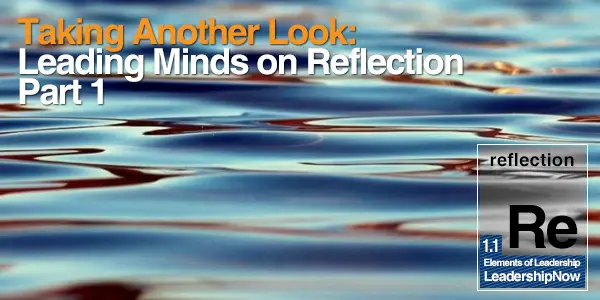 |
 |
02.08.11

Taking Another Look: Leading Minds on Reflection Part 1
John Kotter begins this series on reflection by talking about the need to develop a reflective habit and why we don’t. Are we spending our time on the right issues? Are we delegating issues we should not be working on that could be better dealt with more locally in the organization? Kotter also stresses its importance as a continual learning tool. John Baldoni urges us to make the time to reflect to gain perspective. He reframes reflection as an action step, not a passive process.
In a world that is moving faster and faster, and changing more and in larger leaps, learning becomes a gigantic issue. Doing what you know is not enough. And learning cannot come in a classroom once every 2 years. That’s too little too late. Learning has to be an ongoing process, literally all the time. People learn in many ways. Reading really good books can help. Talking to really good people can help. Nothing wrong with going to a Harvard executive education program, but there is no better teacher than reflection on the world, and especially one’s own actions. I did X. It produced Z. But is Z what we really need? And why did X create Z? And what were the other alternatives? And can I find others (in books, discussions, HBS) that tried those other alternatives? Obviously, self awareness makes this easier. If I pay no attention to what I am really doing, what it is really producing, it’s hard to reflect on that. One can be both action oriented and reflective. Action oriented means when you know what to do and you do it. Now. Not next quarter. Let’s go. Reflection means using the time on airplanes, when you’re not on the slopes or with family at the ski lodge, Zenning-out on the beach—whatever—to think. People don’t reflect because they have no time, but usually because they don’t delegate enough, let others delegate up to them, or don’t have the staff they can delegate to—all correctable problems. People don’t reflect because they haven’t—so they have no reflective habit, so to speak. Correctable too. Since the end game is life, not one’s job, all this is not only applicable to life in general but is arguably more important for life in general. And since leaders have the capacity to help or hurt us all a great deal, everything I have said here is very important in their case.
Reflection is a powerful tool for leaders, and one that is much underused. The chief reason is perceived lack of time. I remember asking the late Skip LeFauvre, the man who ran Saturn, how he found time for it. He said, "Put it on your schedule." Reflection is a means of gaining perspective. It challenges you to think where you are now and where you might want to go. How to get there is a good thing to consider during reflection.
Constant change doesn’t lend itself to instantaneous insights through simple phrases like “too big to fail,” and “liquidity crisis.” The question we must ask ourselves is this: In the midst of dramatic and extreme change, has decision making devolved into merely informed chaos, or can we imbed reflection and think time into our habits and routines to arrive at better outcomes and understanding? —Daniel Patrick Forrester, Consider
More in this Series:
Posted by Michael McKinney at 01:47 PM
|
BUILD YOUR KNOWLEDGE
 

How to Do Your Start-Up Right STRAIGHT TALK FOR START-UPS 
Grow Your Leadership Skills NEW AND UPCOMING LEADERSHIP BOOKS 
Leadership Minute BITE-SIZE CONCEPTS YOU CAN CHEW ON 
Classic Leadership Books BOOKS TO READ BEFORE YOU LEAD |